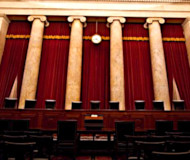Article from: www.thenewspaper.com/news/68/6829.asp
11/6/2019
US Supreme Court Takes Up the Owner Is The Driver Presumption
US Supreme Court debates one of the key principles underlying the use of red light and speed cameras.
 One of the central premises underlying photo enforcement was debated before the US Supreme Court on Monday. The high court justices held oral arguments in a case involving a pickup truck driver who was ordered to pull over to the side of the road for no reason other than that the vehicle was registered to someone with a revoked license.
One of the central premises underlying photo enforcement was debated before the US Supreme Court on Monday. The high court justices held oral arguments in a case involving a pickup truck driver who was ordered to pull over to the side of the road for no reason other than that the vehicle was registered to someone with a revoked license.
Last year, the Kansas Supreme Court unanimously ruled that it was not reasonable for the purposes of the Fourth Amendment to presume the owner of a car is necessarily the person behind the wheel (view decision). The case involved a 1995 Chevrolet 1500 pickup truck that was obeying all traffic rules when Douglas County Sheriff's Deputy Mark Mehrer nonetheless conducted a traffic stop on April 28, 2016. The truck was registered to Charles Glover Jr, who was not supposed to be driving, but the deputy had no idea who was behind the wheel at the time. The officer just assumed it would be Glover.
"There was one judge below who said: In my experience, that presumption doesn't make sense," Justice Sonia Sotomayor observed.
Kansas Solicitor General Toby Crouse argued that it was simply common sense that the owner was likely to be the driver. He added that it was not necessary for the officer to attempt to look in the window to see who might be driving. Reasonable suspicion exists, Crouse argued, merely because the vehicle is owned by someone with a suspended license.
"The only basis for the reasonable suspicion is not a totality of the circumstance, it's one circumstance, the registered owner's driver's license has been suspended, period," Justice Ruth Bader Ginsburg said. "That's -- that's the only factor... The officer doesn't have to make any effort at all."
Justice Neil Gorsuch added that the presumption makes less sense for the next generation of drivers who tend to rent rather than own cars.
"You're asking us to write a rule for the Constitution that presumably has some duration to it," Justice Gorsuch told Crouse. "Is this one with a short expiration date?"
Glover's attorney, Sarah E. Harrington, argued that any traffic stop at all could be justified merely by having the officer say his training made him suspicious. In this case, she said, prosecutors produced no evidence for their claim that the owner was driving.
"It's the opposite of common sense to think that someone having a suspended or revoked license is going to have no effect at all on whether they drive," Harrington argued.
Chief Justice John Roberts challenged that idea.
"I think the inference cuts the other way," Chief Justice John Roberts said. "We know somebody's already broken the law in some sense; he's got a suspended license. I think it's probably more likely than not that he would break the law saying you can't drive with a suspended license."
 One of the central premises underlying photo enforcement was debated before the US Supreme Court on Monday. The high court justices held oral arguments in a case involving a pickup truck driver who was ordered to pull over to the side of the road for no reason other than that the vehicle was registered to someone with a revoked license.
One of the central premises underlying photo enforcement was debated before the US Supreme Court on Monday. The high court justices held oral arguments in a case involving a pickup truck driver who was ordered to pull over to the side of the road for no reason other than that the vehicle was registered to someone with a revoked license.